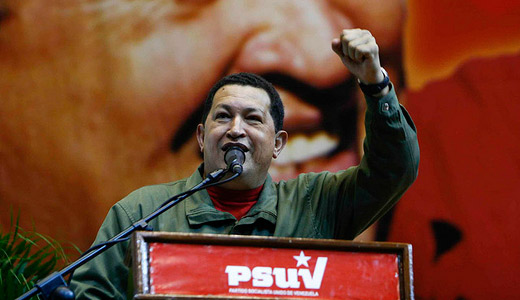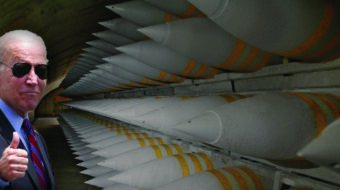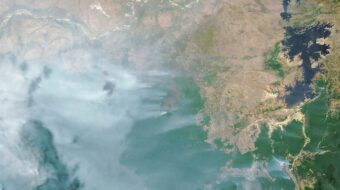
The reelection, for a third term, of Venezuela’s left wing president, Hugo Chavez of the Unified Socialist Party of Venezuela (PSUV), has set off wails of anguish in the right-wing media and political circles in the United States. In fact, it is a supremely important development with profound implications for the hemisphere and the world.
The Wall Street Journal outdid itself by comparing the people who voted for Chavez with the 47 percent in the United States who Mitt Romney claimed were hopelessly dependent on government handouts. According to the Journal, by vastly improving Venezuela’s public services in health and education, and by helping millions of Venezuelans out of poverty, Chavez has created massive dependency on government on an unprecedented scale.
No silver lining here, helping people to improve their incomes is all bad, unless they are already rich. The way the right and the ruling class see the functions of government is reflected in such statements with crystal clarity.
The actual implication of the Venezuelan election is that Latin America may now finally escape from its dependency on, and subordination to, the United States and U.S.-based corporations. In his famous 1823 “Doctrine,” U.S. President James Monroe asserted the right of the United States to take action to prevent interference in the Western Hemisphere. But Monroe did not promise that the United States itself would not do some interfering.
This was manifested by the U.S. war with Mexico from 1846-1848, and by the 1904 (Theodore) Roosevelt corollary whereby the U.S. government awarded itself the role of “enforcer” over the internal and external affairs of the other hemispheric states.
Since then, the United States has interfered in almost every single Latin American country. After the Cuban Revolution triumphed on January 1, 1959, this interference developed a special focus on overthrowing the Cuban government and preventing leftists, broadly defined, from triumphing anywhere in the Americas. It led to bloody incidents such as the overthrow of the progressive government of President Jacobo Arbenz of Guatemala in 1954, the intervention in the Dominican Republic in 1964, the overthrow of socialist President Salvador Allende of Chile in 1973, the “Contra Wars” against progressives in Central America during the 1980s and 1990s, the overthrow of President Manuel Zelaya in Honduras in 2009, and others too numerous to mention.
But gradually, the nations of the hemisphere have been forging internal and external bonds which promise to break the pattern. The ALBA (Bolivarian Alliance for Our America), consisting mostly of countries whose governments proudly announce their socialist orientation (Bolivia, Cuba, Ecuador, Nicaragua, Venezuela and some small island nations) is the most left-leaning of a series of structures that serve this purpose. Venezuela, with its oil wealth, is the key player in ALBA and also in Petrocaribe, an 18-nation bloc through which Venezuelan oil is marketed regionally on very easy credit terms.
Beyond these, there are UNASUR and MERCOSUR, in which left, center and right-wing governed countries all participate. Finally, there is CELAC (Community of Latin American and Caribbean States), which includes 33 countries, that is, all the area’s independent states except the United States and Canada. CELAC may soon displace the venerable Organization of American States, which, ceding to U.S. demands, has excluded active Cuban participation since the revolution. As if to highlight the change, Cuba has just been chosen to preside over CELAC for the coming period, including in economic negotiations with the European Union starting in January of next year.
Not least because of Venezuela’s efforts, the Free Trade Area of the Americas died an unmourned death.
Partly because of the economic impact of its oil wealth, Venezuela has played a key role in the entire “Bolivarian” process of integrating the Latin American economies while reducing the role of the United States in the region. This is why the Wall Street Journal, and a whole lot of other people, are wailing and gnashing their teeth. The right-wing opposition presidential candidate in the Venezuelan elections, Enrique Capriles Rodonski, had promised to end Venezuelan petroleum aid to Cuba and the other poorer countries in the hemisphere. Had he been elected, and had he kept his word, this “Bolivarian Project” would have been severely jeopardized.
And what of the United States? The Obama administration pointedly congratulated the Venezuelan people, and not Chavez, for the elections. Romney claimed that the current administration has been “soft” on Venezuela, and that he would somehow do something different. As usual, he gave no specifics whatsoever.
Last year, one of Mexico’s most prominent left-wing politicians, Andres Manuel Lopez Obrador sent an open letter to Hillary Clinton suggesting that the United States should return to the “Good Neighbor” policy of Franklin Roosevelt, i.e. of non-interference in other countries’ affairs.
It is not too late, and there are no other options.
Photo: Bernardo Londoy // CC 2.0












Comments